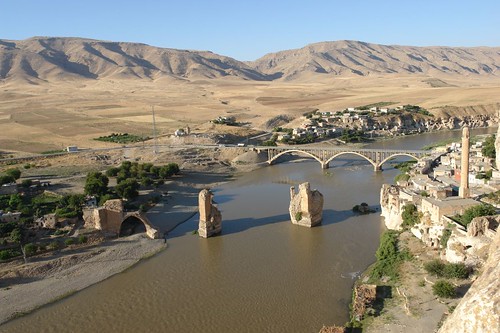Staatsbezoek Turkije
The Queen of the Netherlands, Beatrix is making the first visit of a Dutch sovereign to Turkey at the moment, taking along with her the Crown Prince Willem Alexander and his Argentinean wife, Maxima. This is to mark 400 years of relations between the two countries.
It comes at an appropriate time, given the recent discussions in Holland about the Armenian 'genocide', the dual nationalities of two state secretaries (one of whom is Turkish) and the question of Turkey's future membership of the EU. The Queen has been strongly advised not to upset the Turks by bringing up the subject of what happened to the Armenians in 1915. It is felt best that the Turks deal with this issue amongst themselves rather than be lectured to by a visiting head of state, a position I thoroughly support.
The issue of dual nationality has been brought up by a right-wing party which did very well at the last elections going from one seat to nine, on the basis of policies which are predominantly anti-Islam, appealing to people's base sentiments. This party is saying that a person with dual nationality has divided loyalties which could affect the way they think about and deal with various issues which some up. I do not believe they really feel it is such a problem but are using as a way of undermining the confidence of and in these two politicians and creating an atmosphere which is hostile towards Islam. The party calls itself the party for freedom, but the only freedom they particularly seem to stand for is the freedom to avoid Muslims.
Most important though is the question of Turkey's future membership of the EU. The Dutch government has been relatively neutral on the issue, being neither in favour, like the UK, or against, like France. Somewhere in the middle. However, our new Christian-tinged government has agreed to be tougher on new entrants to the EU, in what is basically seen to be a blocking of the door for Turkey. Maybe because it does not have a Christian heritage? I don't know.
We were watching the 1964 film The Fall of the Roman Empire, with Sophia Loren, Alec Gioness, Stephen Boyd, James Mason and Christopher Plummer, dealing with the time around teh death of the great Marcus Aurelius, when he was followed by his son Commodus, rather than his chosen Livius. Marcus Aurelius had made the Roman Empire great again, not necessarily by force, but through diplomacy and good government. Commodus only believes in force and gladiator fights. Livius wants to carry on the good work of Marcus Aurelius and it is the struggle between the two men which forms the basis of the drama.
Livius defeats the (German) Barbarians and offers to make the leaders, against whom Rome has been fighting for centuries, citizens of Rome, to share in the ideals of Rome, the Pax Romana. He reasons that by letting them partake in the Roman Empire as equal citizens will make them appreciate the values of Rome and will stop them continually fighting Rome. Livius is the voice of reason, of hope, of peace.
Of course, Commodus thinks he is mad and wants to kill and subdue the Barbarians, reasoning that they are different from the Romans culturally, that they have done bad things in the past and they need to be punished.
These look a lot like the arguments for and against Turkey's future membership of the EU where, as ever, the words of darkness and negativity seem to shout louder and be better understood than the words of hope and postivity.
This photo shows the old Roman bridge over the River Tigris at Hasankeyf, in south-eastern Turkey. Still here after all these years, a fitting tribute to the might of the Roman Empire.
Labels: Turkey





2 Comments:
chrome hearts
yeezy boost 350 v2
adidas nmd
adidas store
cartier love bracelet
nike air zoom structure 19
yeezys
gucci belts for men
curry 3
nike roshe run one
yeezy boost 350
jordan shoes
yeezy
yeezy boost 350 v2
curry 7 shoes
pandora
nike react
hermes belt
yeezy boost 380
a bathing ape
Post a Comment
<< Home